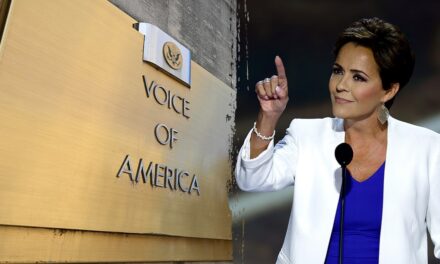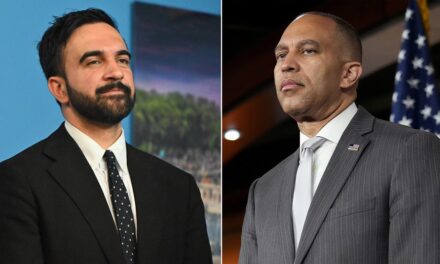In a significant shift in programming, MSNBC has recently revamped its lineup in an attempt to revitalize its evening broadcasts and attract a broader audience. However, the results have not been as favorable as anticipated. The new host, Jen Psaki, former White House Press Secretary, has reported a staggering 47% slump in viewership compared to her predecessors during the same time slot.
Historically, MSNBC has maintained a strong presence in cable news with a roster of prominent personalities who have been able to engage audiences effectively. The network has sought to reinvent itself by introducing faces that resonate with the current political climate and appeal to younger, more diverse viewers. Yet, the drastic decline in viewership for Psaki’s new show raises questions about the effectiveness of these changes and highlights the challenges cable news networks face in today’s media landscape.
Psaki’s show, which replaced a long-running program that was led by one of the channel’s key figures, had high expectations. Many insiders believed that her experience as a seasoned communicator in the political arena would draw in viewers who appreciated her insights into current events. Unfortunately, the opposite has happened, with her numbers indicating a steep drop-off in engagement.
This downward trend in viewership may stem from various factors. Firstly, Psaki is navigating a landscape where audience preferences are continually evolving. Viewers increasingly gravitate towards social media platforms for news consumption, making traditional television broadcasts less appealing. Furthermore, the replaying of news cycles and political commentary might not captivate audiences as it once did, as they seek fresh and engaging content.
MSNBC’s decision to revamp its schedule aimed to capture a new audience while retaining existing loyal viewers. However, the premise of relying on familiar personalities and their political clout has not paid off for Psaki’s program. Critics and analysts alike have noted that the drastic viewership drop signifies a disconnect between what the network offers and what audiences are currently demanding.
Experts in media analysis suggest that the network has a mountain to climb in order to regain the trust and interest of viewers. The decline in viewership can be partially attributed to a saturated market, where multiple news outlets vie for attention with varying approaches to reporting on similar stories. As networks struggle to differentiate their offerings, audience loyalty becomes increasingly challenging to cultivate.
The role of Jen Psaki in the revamped lineup is critical, yet it may be too early to draw definite conclusions about her performance. Setting new ratings milestones during her initial weeks on air could prove to be an uphill battle as she attempts to establish her identity and gain credibility with a potentially skeptical audience. While she comes packed with a strong track record as a communications expert, transforming that into viewership is an entirely different challenge.
Since stepping into her role, Psaki has leveraged her political insights and sharp analytical skills to engage with pressing topics such as the current state of democracy, governance challenges, and social issues resonating across the country. However, the significant gap in viewership indicates that simply tapping into these pressing matters is not enough to attract an audience that has options readily available to them through various platforms.
MSNBC’s case is further complicated by the broader trends impacting cable news as a whole. Declining subscriptions to cable television have shifted the landscape significantly. Moreover, the rise of streaming platforms and YouTube personalities who offer bite-sized, opinionated, and often sensationalized takes on current events has drawn away traditional viewers.
Some industry analysts have proposed that a lack of on-screen chemistry and the format employed in Psaki’s show could contribute to its lukewarm reception. Viewers often appreciate engaging discussions that delve into multiple viewpoints. In contrast, if the new format leans too heavily on conventional interviewing styles or lacks vibrant interaction, audiences may find it less appealing.
As MSNBC continues to assess its programming, it is essential to consider the needs and desires of its target demographics. The network must grapple with the challenge of reaching out to younger audiences who appreciate diverse opinions and thorough analysis but also favor modern content delivery methods. Bridging that gap will likely require more than merely introducing new faces to existing formats.
For Jen Psaki’s show to recapture the lost audience, MSNBC may need to brainstorm innovative approaches, whether through interactive segments, audience engagement via social media, or the introduction of varying guest commentators who can provide new perspectives. The prevailing belief is that simply amplifying traditional formats will not suffice. Flexibility and a willingness to adapt to the changing media environment are paramount for success.
In the context of cable news networks, the shift is more than just ratings; it’s about relevance in an era where audiences elongate their attention spans online. Networks must grapple with how to translate charisma and insight into compelling television that resonates with their viewers. Jen Psaki’s efforts, while promising, face the daunting reality that viewer loyalty is fickle and easily swayed by the myriad of options available today.
The current landscape demands not just smart political discourse. It requires innovative formats capable of captivating diverse audiences. As the dust settles on MSNBC’s revamped lineup, the network will be closely watched to see how they address these pressing issues and if Psaki can pivot her approach to rally her audience and pull them back from previous highs. The stakes will remain high as viewership trends evolve alongside the political landscape, and the competition grows more fierce.
In conclusion, while Jen Psaki’s entry into the primetime scene of MSNBC is a tantalizing prospect, the significant drop in viewership indicates a larger narrative about media consumption in the current era. As networks strive to rethink their strategies, the story extends far beyond individual hosts; it touches upon the broader dynamics that define television in a digitally-driven age. Whether MSNBC can reclaim its hold on audiences remains to be seen, but one thing is clear: just putting fresh faces on the air isn’t enough in today’s fast-paced media environment.
































